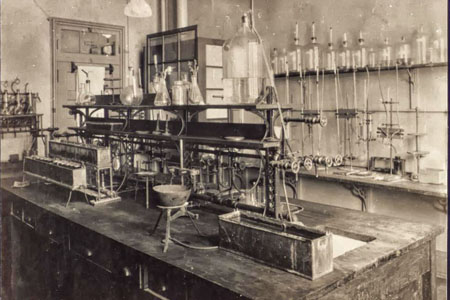Agnes Charlotte Higgins (née Quamme), CM, nutritionist (born 18 June 1911 in Finley, North Dakota; died 27 August 1985 in Montreal, QC). Higgins began working at the Montreal Diet Dispensary in 1948 and was the Executive Director from 1959 until her retirement in 1981. She is best known for developing the “Higgins Method,” a nutritional program designed to help pregnant women improve their health and deliver healthy babies. Higgins’ influence on nutrition education extended throughout Canada, North America and much of the world. (See also Childbirth in Canada.)
Early Career
Agnes C. Higgins was educated at the University of Minnesota where she studied home economics. She began her career working with General Mills in Minneapolis, Minnesota, as a home economist at the Betty Crocker Test Kitchen. During her time working for General Mills, Higgins was one of several women trained to answer mail addressed to “Miss Betty Crocker.”
Higgins moved to Montreal in 1942. Before joining the Montreal Diet Dispensary in 1948, she worked in prenatal clinics where she first observed that impoverished women often had sickly and underweight babies. (See also Childbirth in Canada.)
Montreal Diet Dispensary
The Montreal Diet Dispensary was originally founded in 1879 as a volunteer organization that prepared nutritious meals for sick and impoverished individuals in Montreal. (See also Food Insecurity in Canada.) The Dispensary continued operating as a food kitchen for many years and started focusing on food distribution and dietary education from the late 1920s on.

Beginning in 1963, the Dispensary began collaborating with Montreal’s Royal Victoria Hospital to provide nutrition counselling to mothers attending maternity clinics. The Dispensary’s nutrition counselling services marked the start of a new nutrition assessment and counselling method that Higgins would test in a decade-long study.
Higgins Method
Agnes C. Higgins’ primary scientific contribution was a study conducted between 1963 and 1972 on the benefits adequate nutrition had on childbearing women and their babies. By collecting data from clients of the Montreal Diet Dispensary, Higgins found that factors such as diet, income and access to nutritional foods, put pregnant women at risk of adverse pregnancy outcomes, like low birth weight. With her data, Higgins was able to demonstrate that the birthweight and general health of newborns, and in turn childbearing women, could be improved by identifying and addressing the individual nutritional needs of pregnant women.
Through her work, Higgins initiated the first systematic approach to identify women at risk of adverse pregnancy outcomes and to address these outcomes through nutritional intervention. The program, known as the Higgins Nutrition Intervention Program or the Higgins Method, included guidelines for assessing the diet of pregnant women, for determining their individual nutritional needs and deficits, and for providing counselling to women in areas of nutrition and infant care. The Higgins Method was well ahead of its time, both in terms of prenatal care and as a philanthropic endeavour, as it provided women in need with free foods (e.g. milk, eggs and oranges) and supplements in addition to counselling.
Higgins was determined to ensure that her method would lead to what she termed “Blue Ribbon Babies,” and she routinely evaluated her program and its outcomes to refine the Higgins Method. The Higgins Method proved to be successful as different studies have shown that nutritional intervention helps prevent adverse pregnancy outcomes.
The success of the Higgins Method led the March of Dimes to fund 20 three-week training sessions for American health professionals from between 1978 and 1981. Each session included one Canadian, and in 1981-82, sessions were given exclusively to Canadian health professionals.
Later Career
Agnes C. Higgins worked at the Montreal Diet Dispensary for 33 years (serving as the Dispensary’s Executive Director from 1959 to 1981). According to her honorary degree citation from Concordia University, Higgins also served as president of the Corporation of Dieticians of Quebec, as Vice President and Consultant to the Board of Directors of the Quebec branch of the Consumers' Association of Canada and as a member of a select task force of the National Academy of Sciences in the United States. In 1974, she was appointed to the Canadian Consumer Council, all while continuing her work with the Dispensary.
Legacy
The Higgins Method established a nutrition standard that informed social nutrition programs at the Montreal Dietary Dispensary and other programs, including the Canada Prenatal Nutrition Program (CNP) and the Special Supplemental Nutrition Program for Women, Infants and Children (WIC) in the United States.
Agnes C. Higgins and the Dispensary are also credited with establishing budgets used as a basis to determine family allowances, public assistance and Old Age Security benefits in Canada (see Old-Age Pension).
In 1980, the March of Dimes inaugurated the Agnes Higgins Award “in recognition of distinguished achievement in research, education or clinical services in the field of maternal-fetal nutrition.”
Select Honours and Awards
Agnes C. Higgins received numerous awards and recognitions during her career, including:
- Fellow, Britain's Royal Society of Health (1972)
- Member, Order of Canada (1975)
- Honorary Doctor of Laws, Concordia University (1975)
- Woman of Achievement, YWCA of Montreal (1975)
- Goodhost Achievement Award, Canadian Dietetic Association (1979)
- Earle W. Crampton Award, McGill University (1985)

 Share on Facebook
Share on Facebook Share on X
Share on X Share by Email
Share by Email Share on Google Classroom
Share on Google Classroom










